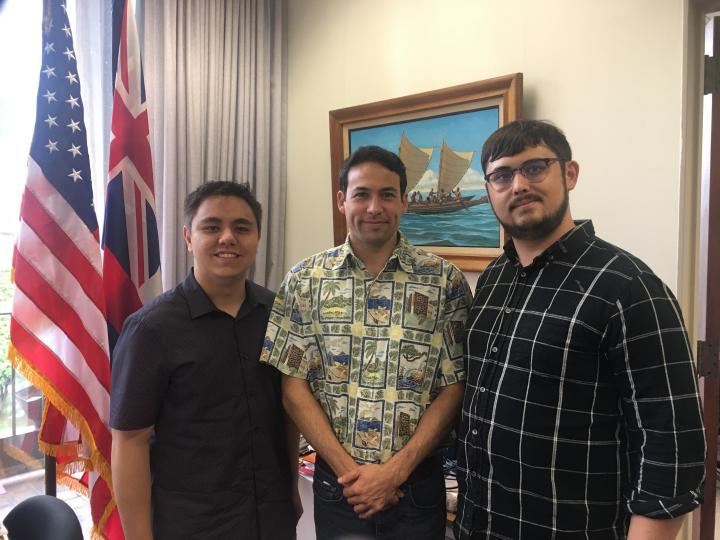Representative Chris Lee has had a lot of attention recently. As a Hawaii State House Representative, he along with Rep. Sean Quinlan have announced upcoming government action regarding “predatory practices in online gaming”, referencing the recent Star Wars Battlefront II “loot box” controversy.
For the uninitiated, company Electronic Arts made national headlines after the release of the latest Star Wars game, in which iconic characters such as Darth Vader were locked behind progression, progression was achievable through microtransactions, and paying for microtransactions didn’t even guarantee you the items you want or need. Mainstream media such as CNN and Fortune picked up on the story, and public reputation for EA and Star Wars’ IP owner Disney took a decline.
Other countries such as Belgium have responded to the loot boxes in varying ways. However, in America, it’s Representative Lee who was first to approach the topic. In a press conference held in November of 2017, Rep. Lee outlined his stance on the issue, calling EA’s business practices “predatory”. “We’re looking at legislation this coming year which could prohibit access or prohibit the sale of these games to folks who are underage in order to protect families,” said Lee in his November press conference.
I had some time to speak to Representative Lee about his upcoming plans.
[Gaming is] both a hobby and a passion
At Representative Lee’s office at the Hawai’i State Capitol Building, he told me about his experience with video games. “I go way back to almost every platform most consumers have seen since I was 7 or 8,”, said Representative Lee. As one of Hawai’i’s younger members of the state legislature, he knows firsthand how games have come about since the 80’s. “It’s really evolved. I think both the kinds of games like your early console games up to PC and mobile games now. It’s something that’s always been there for me, particularly with friends. It’s both a hobby and a passion.”
As for his gaming schedule today, he’s very busy with his job and the upcoming legislative session. With what time he has had, he’s been recently invested in a VR game named Pavlov VR. “It’s like a VR Counterstrike. It’s so much fun. It’s been the single thing I’ve spent most of my time playing [recently]”, said Lee.
As for games on mobile or games with microtransactions, his experience may seem familiar. “I used to have Clash of Clans and Clash Royale and there might have been one other in that category, but I’ve pretty much ditched all of those. I travel a lot going to D.C. and back, so a lot of stuff I find [waiting] in the airport. I’ve tried to get away from...microtransaction-based mobile games,” Lee said.

Work on the bill has been well documented on Chris’ Lee’s YouTube page. In his most recent video, Lee’s demonstrated interaction with fellow government officials is shown to be fruitful. And this has reached across borders as well. “We’ve been talking with regulators in other countries and other states on that level about the way most existing laws frame the kinds of questions that are being raised by loot boxes and other sorts of mechanisms. That raises the question of how do you fit a modern game and mechanic that didn’t exist five or ten years ago, into a 20th Century law that’s been around for 50+ years?”
In some places, such as the UK and New Zealand, there is an acknowledged risk that unfortunately doesn’t fit into the already existing legal system. This is where the government needs to step in, according to Lee. “Inevitably it’s going to kick back to the elected officials both here and everywhere else...There’s likely, almost certainly, going to be a number of different places taking action legislatively to basically update what were 20th-century laws to reflect the modern reality of the risks that some of these game mechanisms pose to the public.”
Framing the loot box issue as a public threat allows government entities and officials like Lee to tackle issues brought on by its effect on young minds. “You’re going to have Departments of Health or similar mental health experts. We know there are a number of studies in the works because we’ve been contacted by a ton of different places...What the research and data really points to is, yes it’s a problem now, but in 10 years and 20 years it’s going to be a much larger problem because then you’ll have built into a whole generation of people a problem with addiction, and that translates not just through video games, but through a lot of aspects of life. That’s the kind of social harm that ultimately all taxpayers will be on the hook for.”
What the research and data really points to is, yes it’s a problem now, but in 10 years and 20 years it’s going to be a much larger problem
As for the action itself, starting at the state level is important to Lee. “If an individual state were to do it…it’s probably less likely.” What Lee envisions is multiple states creating a legal precedence to regulate or prohibit sale of microtransactions. “ And ultimately, some form of broader disclosure where as a consumer you know right upfront before you even download a game or purchase it the kinds of mechanisms that are involved or included.” This is a key feature to keep games’ monetization models available to scrutiny for parents. And it’s going to have an affect across the nation.“It could be one year, two years, but inevitably things are gonna move, and at that point the industry will have to come up with a standard to meet the lowest common denominator.”
Since the inaugural press conference back in November 2017, there has been much outreach to the representative’s office. “The unity in the public supporting the direction this conversation is going. We’ve been contacted by not only other legislators to do something about this but just people, from all across the country and from all different walks of life,” said Lee. “This isn’t a partisan issue. I think I’ve heard from as many Republicans as Democrats.”
“And the most surprising thing is the industry insiders,” Lee explained. “One guy put it this way, he said ‘I didn’t get into this to sell a framework to extract money’. He got in to design games because he was a gamer, and what he was essentially forced to do was not what he signed up for. There’s so many people who have reached out on that front.”
As for backlash, Lee says there’s been a small but steady presence from the start. “There’s definitely going to be an opposition, and a lot of it’s going to be manufactured. I’ve seen this already on Reddit right now.” According to Rep. Lee, he had been contacted about a number of bots set up to regulate his content, a problem that is fairly prevalent within Reddit. “When there’s billions of dollars in an industry on the line, you’re gonna spend what you’re gonna spend. That’s the way that a lot of these battles have gone down.”

Because there’s that community, because it’s nonpartisan, because there’s so many people with first-hand experience, it’s only a matter of time.
Luckily Lee has experience tackling big business. “I’ve been down this road before battling utility merger with NextEra.” Chris’ efforts to combat a utility merger in Hawai’i helped keep a large corporation from expanding.
Above all, it’s important to be hopeful and stay positive. “I think it’s easier than people realize. Because there’s that community, because it’s nonpartisan, because there’s so many people with first-hand experience, it’s only a matter of time.”
“Our first obligation as elected officials is to protect the public health and safety, and this is clear case where there’s elements of an industry which are knowingly and intentionally exploiting vulnerable people in a way that is unethical and unconscionable.”




